
Erlang Shen, or simply Erlang, is a god in Chinese folk religion and Daoism, associated with water, justice, warriorhood, hunting, and demon subdual. He is commonly depicted as a young man with a third, truth-seeing eye in the middle of his forehead, wielding a three-pronged spear, and being accompanied by his loyal hunting dog, Xiaotian Quan.
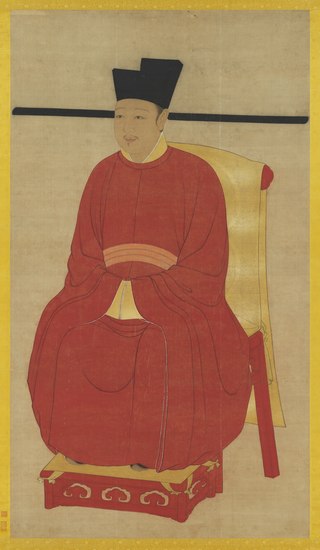
Emperor Huizong of Song, personal name Zhao Ji, was the eighth emperor of the Song dynasty of China and the penultimate emperor of the Northern Song dynasty. He was also a very well-known painter, poet and calligrapher. Born as the 11th son of Emperor Shenzong, he ascended the throne in 1100 upon the death of his elder brother and predecessor, Emperor Zhezong, because Emperor Zhezong's only son died prematurely. He lived in luxury, sophistication and art in the first half of his life. In 1126, when the Jurchen-led Jin dynasty invaded the Song dynasty during the Jin–Song Wars, Emperor Huizong abdicated and passed on his throne to his eldest son, Zhao Huan while Huizong assumed the honorary title of Taishang Huang. The following year, the Song capital, Bianjing, was conquered by Jin forces in an event historically known as the Jingkang Incident. Emperor Huizong and Emperor Qinzong and the rest of their family were taken captive by the Jurchens and brought back to the Jin capital, Huining Prefecture in 1128. The Emperor Taizong of Jin, gave the former Emperor Huizong a title, Duke Hunde, to humiliate him. After Zhao Gou, the only surviving son of Huizong to avoid capture by the Jin, declared himself as the dynasty's tenth emperor as Emperor Gaozong, the Jurchens used Huizong, Qinzong, and other imperial family members to put pressure on Gaozong and his court to surrender. Emperor Huizong died in Wuguocheng after spending about nine years in captivity. He, along with his successors, were blamed for the Song dynasty's decline.
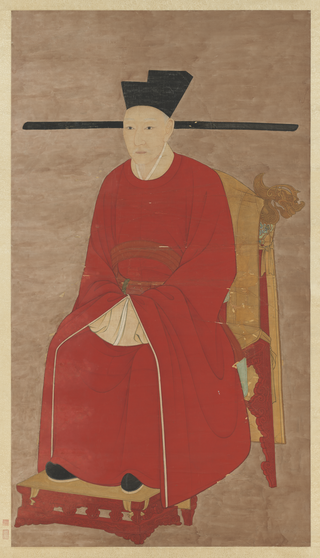
Emperor Gaozong of Song, personal name Zhao Gou, courtesy name Deji, was the tenth emperor of the Chinese Song dynasty and the first of the Southern Song dynasty, ruling between 1127 and 1162 and retaining power as retired emperor from 1162 until his death in 1187. The ninth son of Emperor Huizong and a younger half-brother of Emperor Qinzong, Zhao Gou was not present in the capital of Bianjing when it fell to the Jurchen-led Jin dynasty in 1127 during the beginning of the Jin-Song Wars. Narrowly avoiding capture by Jin forces, he escaped first to Yangzhou and then Lin'an, assuming the throne and reestablishing the Song court. Despite initial setbacks, including Jin invasions and a brief deposition in 1129, Emperor Gaozong consolidated his political position and presided over the continued military conflict with Jin. Prior to 1141, military commanders including Han Shizhong and Yue Fei reconquered portions of the Central Plains while chancellors like Lü Yihao, Zhao Ding, Zhang Jun, and Qin Hui managed the civil bureaucracy.

Zhang Zeduan, courtesy name Zhengdao, was a Chinese painter of the Song dynasty. He lived during the transitional period from the Northern Song to the Southern Song, and was instrumental in the early history of the Chinese landscape art style known as shan shui. He is known for painting Along the River During the Qingming Festival.

Along the River During the Qingming Festival is a handscroll painting by the Song dynasty painter Zhang Zeduan (1085–1145) and copied or recreated many times in the following centuries. It captures the daily life of people and the landscape of the capital, Bianjing during the Northern Song. The theme is often said to be the spirit and worldly commotion at the Qingming Festival, rather than the holiday's ceremonial aspects, such as tomb sweeping and prayers. Read right to left, as a viewer would unroll it, successive scenes reveal the lifestyle of all levels of the society from rich to poor as well as economic activities in both rural areas and the city, and offer glimpses of clothing and architecture. The painting is considered the most renowned work among all Chinese paintings, and it has been called "China's Mona Lisa."
Li Shishi (?-?) was a courtesan(Chinese: 歌妓 / 歌伎; pinyin: Jiǎojì) from Bianjing, the capital of the Song Empire. At the time,courtesan refers to women who engaged in the performing arts for a living, and their scope of work included: singing, dancing, reciting poetry and painting during the Northern Song dynasty. According to Gui Er Ji written by Zhang Duanyi, Emperor Huizong was a regular patron of hers. She fled to Zhejiang or Hunan after the Jingkang Incident of the Jin–Song wars occurred in year 1127 AD, as recorded in Mo Man Lu by Zhang Bangji.
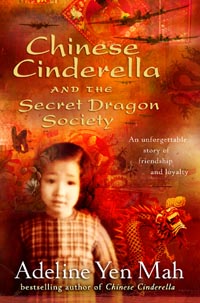
Chinese Cinderella and the Secret Dragon Society is a 2004 historical novel by Adeline Yen Mah. It is the fictional sequel to her autobiography for children, Chinese Cinderella.

Wang Ximeng was a Chinese painter during the Northern Song period, in the early twelfth century. A prodigy, Wang was a student at the imperial court's school of paintings, where he was noticed by Emperor Huizong of Song, who saw Wang's talent and personally taught him. In 1113, at the age of 18, he created his only surviving work, a long blue-green scroll called A Thousand Li of Rivers and Mountains. He died at the age of 23.

The Patriot Yue Fei is a 2013 Chinese television series based on the life of Yue Fei, a Song dynasty general widely regarded as a patriot and culture hero in Chinese culture for his role in defending the Song empire against the Jurchen campaigns. While the plot is based on historical sources and descendants of the general served as consultants, it also includes elements of fiction and draws ideas from the novel General Yue Fei (說岳全傳) and other folktales on his life.
Yang Jian was a huanguan (eunuch) and minister under Emperor Huizong of Song, best-known for implementing oppressive tax policies to increase government revenue. In subsequent works of fiction, such as the classic novels Water Margin and Jin Ping Mei, he is almost always portrayed as treacherous and corrupt.
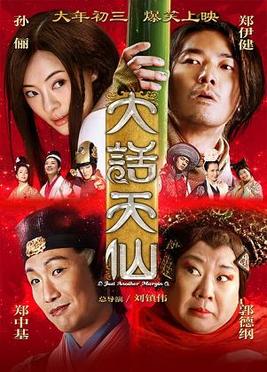
Just Another Margin is a 2014 Chinese spoof-comedy film written and directed by Jeffrey Lau, and starring Betty Sun, Ronald Cheng, Ekin Cheng and Alex Fong. It was released on 2 February 2014.
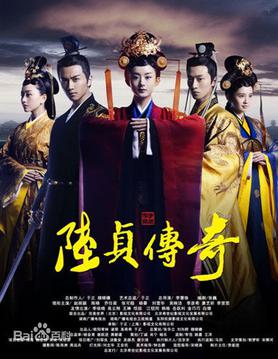
Legend of Lu Zhen is a 2013 Chinese television series based on the novel Female Prime Minister (女相) by Zhang Wei. Directed by Li Huizhu, Zheng Wei'en and Liang Guoguan and produced by Yu Zheng and Mu Xiaohui, the series stars Zhao Liying and Chen Xiao. It was first broadcast on 5 May 2013 in China and subsequently aired in other Asian countries such as South Korea and Japan.

Legend of Zu Mountain is a 2015 Chinese television series starring William Chan, Zhao Liying and Nicky Wu. It is adapted from the novel Legend of the Swordsmen of the Mountains of Shu written by Huanzhulouzhu. The series premiered on iQiyi on 22 September 2015.
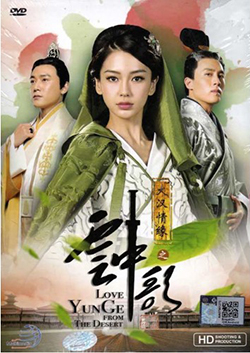
Love Yunge from the Desert is a 2015 Chinese television series based on Tong Hua's novel Song in the Clouds. It is a sequel to Sound of the Desert (2014), also based on a novel by Tong Hua. The series was produced by Yu Zheng and stars Angelababy, Du Chun, Lu Yi, Chen Xiao and Yang Rong. It aired on Hunan Television from 13 September to 23 November 2015.

Legend of Nine Tails Fox is a 2016 Chinese television series based on six tales in Strange Tales from a Chinese Studio by Pu Songling. It originally aired two episodes daily on Hunan TV, Sunday through Tuesday at 22:00, as well as being simultaneously broadcast online on Youku, Tencent, Sohu and iQiyi. The drama was directed by Liu Yufen, Gao Linbao and Xu Huikang, and stars an ensemble cast of actors. The drama is separated into six plots, based on the corresponding stories in the Strange Tales from a Chinese Studio.
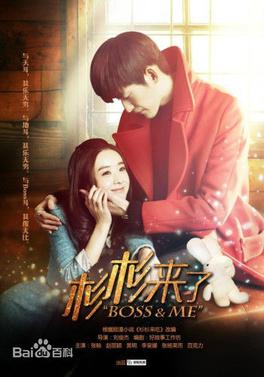
Boss & Me is a 2014 Chinese television series starring Hans Zhang and Zhao Liying. It is based on the novel "Shan Shan Comes to Eat" written by Gu Man. The series aired on Jiangsu TV from 8 July to 20 July 2014.

The King's Woman is a 2017 Chinese television series starring Dilraba Dilmurat and Vin Zhang. It is adapted from the novel The Legend of Qin: Li Ji Story (秦时明月之丽姬传). The series aired on Zhejiang TV every Monday to Wednesday, from 14 August to 4 October 2017.

Bloody Romance is a 2018 Chinese television series based on the novel of the same name by Banming Banmei (半明半寐). It airs on Youku on July 24, 2018, which stars Li Yitong and Qu Chuxiao as the leads. The series air internationally in 13 foreign countries via Youku and Dramafever.
Teresa Ha was a former Chinese television and film actress from Hong Kong. Ha is credited with over 260 films.















